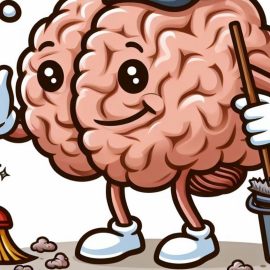
What are the biggest negative beliefs about money? Does money make you selfish?
You Are a Badass at Making Money by Jen Sincero looks at a couple of examples of subconscious negative beliefs about money. Sincero asserts that many of us share these beliefs, as they’re a common part of societal messaging about money.
Let’s discuss these negative beliefs about money and Sincero’s counterarguments for them.
Belief #1: Money Is Wicked and Immoral
According to Sincero, one negative belief about money is that our society views money as something that’s inherently wicked. Therefore, it’s seen as immoral to have a lot of wealth. People who hold this belief will struggle to achieve financial success because, when you think of money as bad, it won’t come to you.
To support the idea that money is wicked, people point to unsavory actions and injustices that seemingly happen because money is involved. For example, someone with this view might use a story of a wealthy person embezzling money from his clients to become even richer as evidence that money is evil and leads to immoral actions. However, such examples are the fault of the perpetrators, not the money itself. Money on its own is neutral, and we’re responsible for giving it meaning.
| Is There a Link Between Wealth and Discourteous Behavior? Some research suggests that there might be a link between wealth and faulty morals— several studies suggest that money may affect the morality of people’s behavior. In one 2012 study, researchers posed as pedestrians about to cross the street at a crosswalk. Every driver in a car of the lowest expense tier stopped for the researchers, but only 50% percent of the drivers who had the most expensive cars stopped. Another study found that thinking about money can make people less helpful. First, participants played a short game of Monopoly with one of the other members of the study. At the end of the game, one group was left with $4000 in Monopoly money and prompted to visualize a future where they were wealthy. The other group ended with $200, and researchers told them to imagine an uncertain financial future. Then, after being told the study was over, each participant encountered someone on their way out who spilled a box of pencils in a way that appeared to be an accident. In reality, the person spilling the pencils was one of the researchers doing it on purpose. The participants who were prompted to visualize themselves as wealthy picked up fewer pencils when helping clean up the mess. Finally, another study found that wealth can lead to unethical behavior: Participants who considered themselves comparatively wealthy took more candy from a jar intended for children. |
Belief #2: Being Wealthy Means Taking From Others
Another common negative belief about money Sincero identifies is that becoming wealthy requires taking resources from someone else. This belief makes us feel guilty about making a lot of money.
However, making the money you need to be the best version of yourself doesn’t actually mean taking from others. The idea that it does stems from a harmful scarcity mindset—the false belief that there aren’t enough resources for everyone.
(Shortform note: One way to break free from a scarcity mindset and develop a mindset of abundance is to give to others. For example, you might help a struggling friend pay for their groceries or donate to a favorite charity. Giving to others involves recognizing that you have resources to share, breaking you out of the thought pattern that there’s never enough. It also lifts up others around you and creates opportunities for others to give back to you if you need it in the future. The good feelings you get from giving can also make your feelings and mindset about money more positive.)
In reality, any wealth you accumulate sets you up to help others because money gives you the power to implement beneficial change. For example, wealthy individuals can donate large sums of money to charities, scientific research, and other worthy causes.
(Shortform note: Wealth may give you the power to implement beneficial change, but whether or not you choose to do so depends on your personality, not the wealth itself. In The Total Money Makeover, Dave Ramsey argues that wealth reveals and magnifies your true character: If you’re kind and generous, you’ll be even more so with your wealth. In this case, you’d likely use your money to help others. However, if you’re already deceitful, miserly, or happy to take from others for your own gain, money will magnify these traits as well. Wealth itself won’t make you more generous—instead, it may make you less so.)






